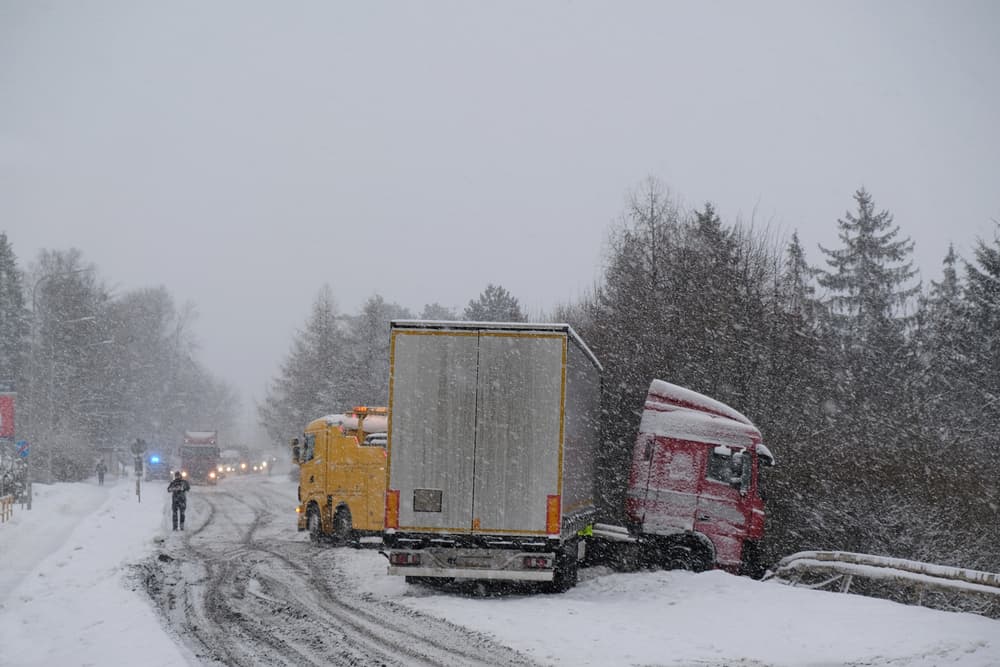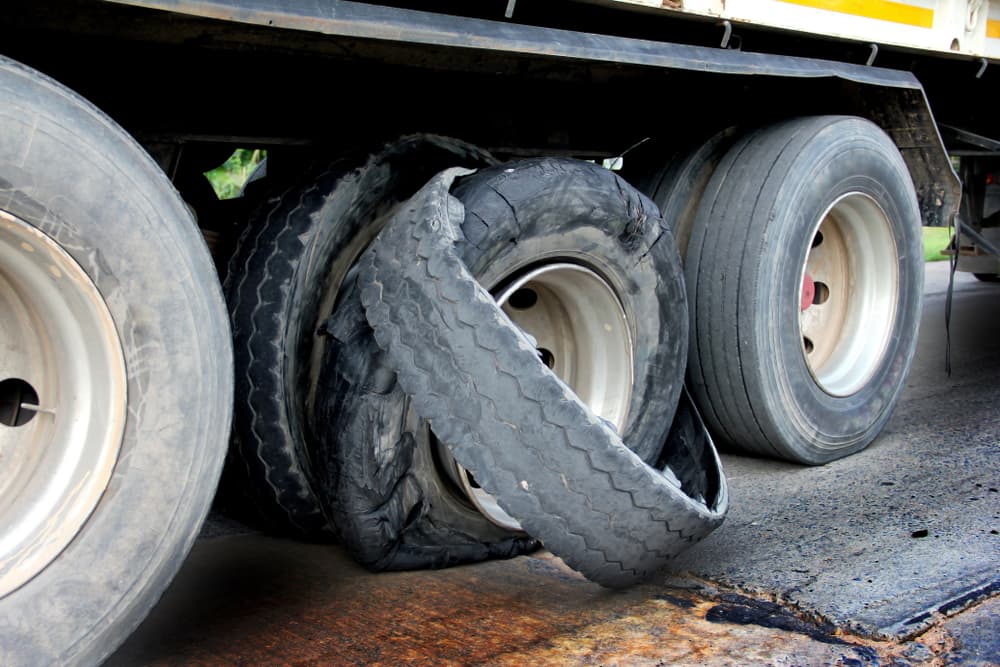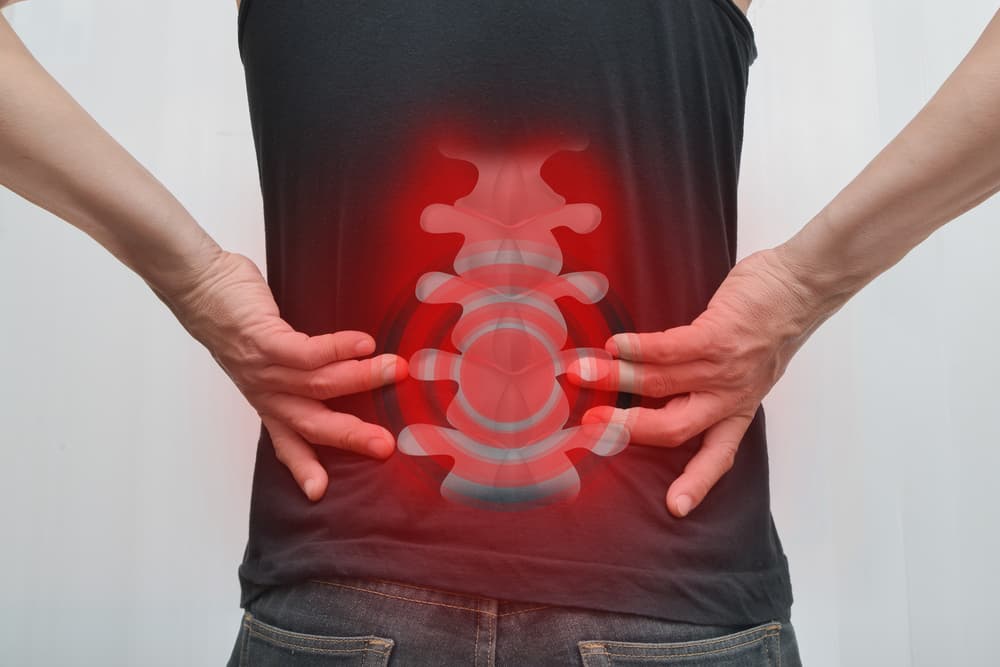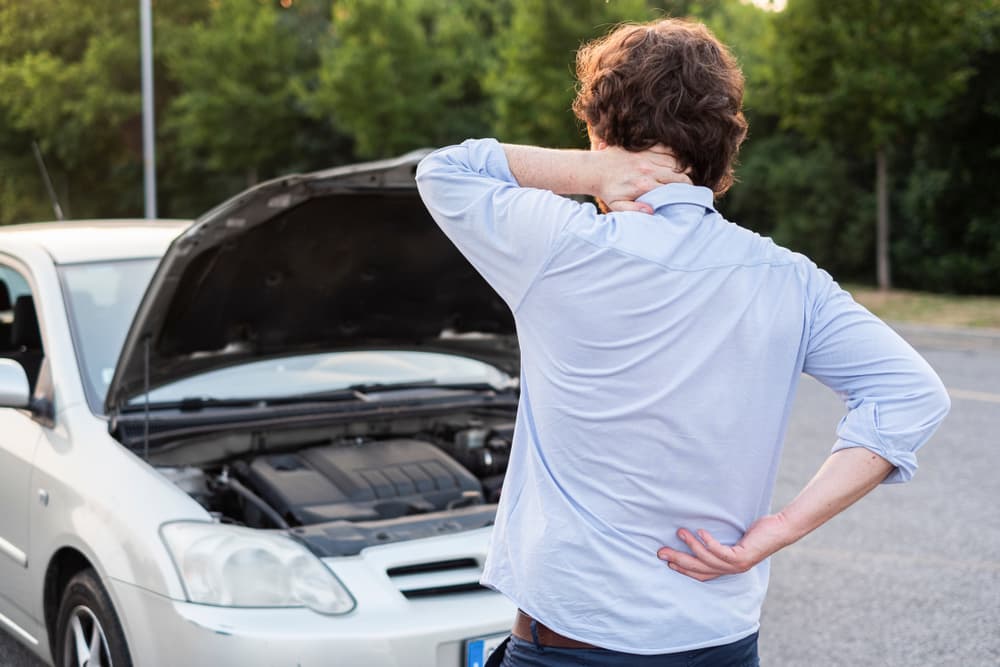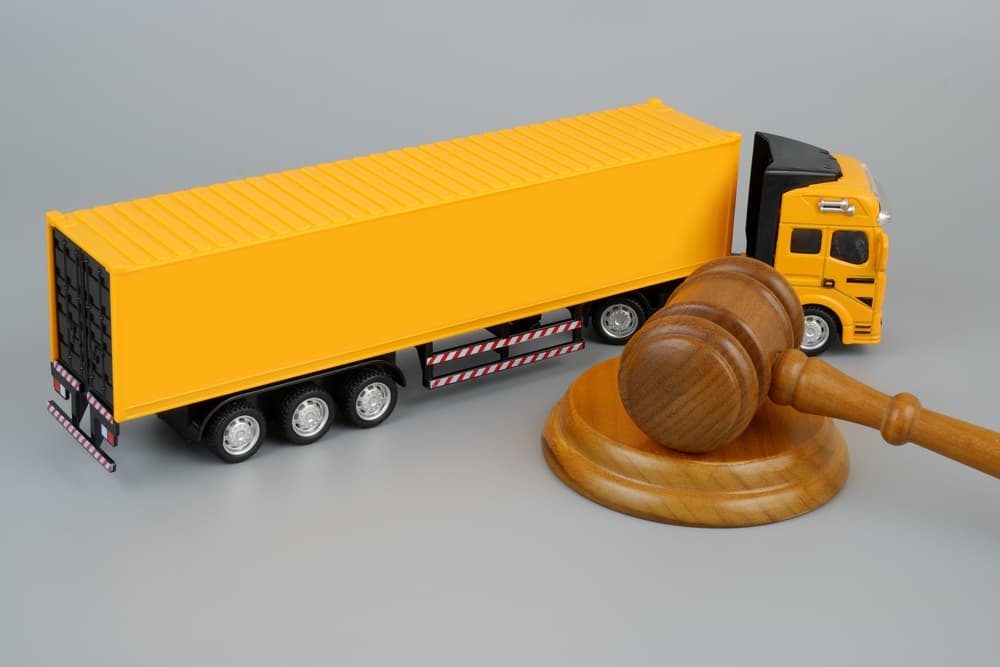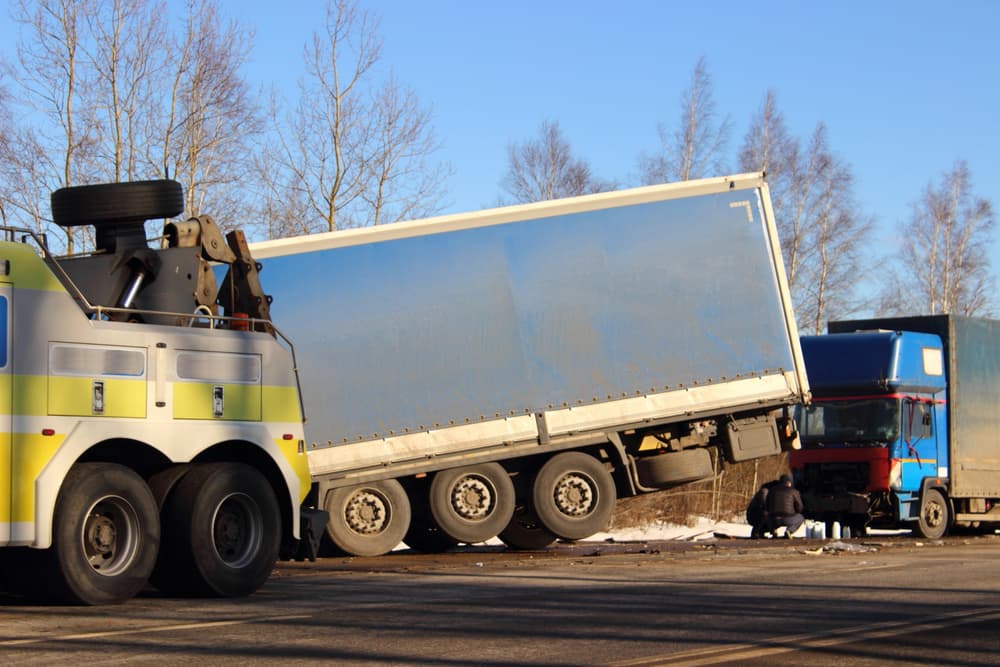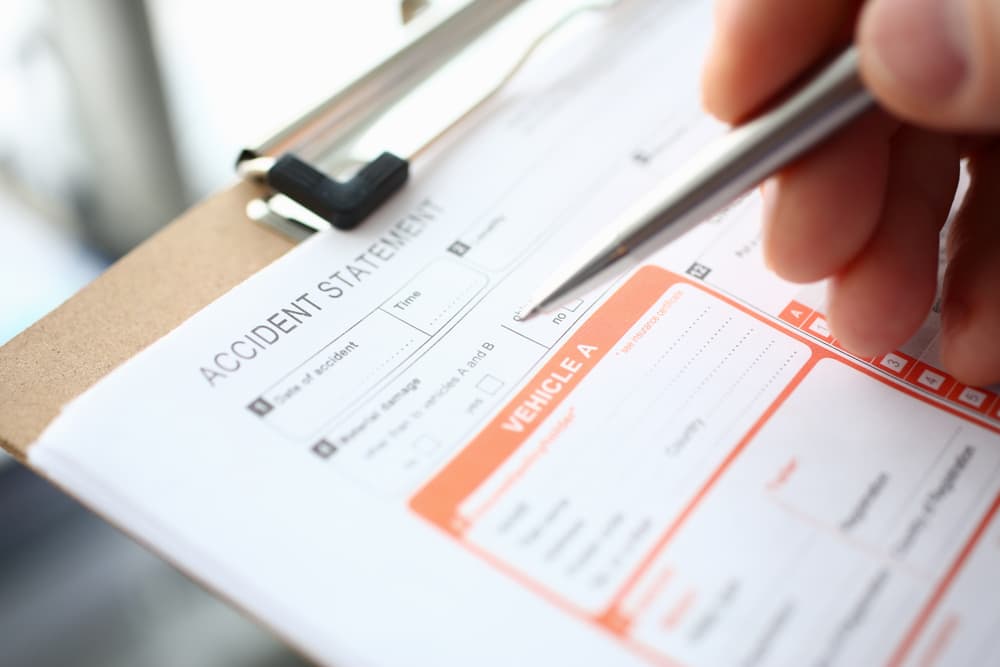Truck accidents can be terrifying and dangerous, especially when they involve big rigs jackknifing on the highway. If you've suffered an injury in a jackknife truck crash, you may be wondering what caused it and what kind of injuries people often get.
Below are some of the main reasons jackknife accidents happen and the types of injuries they can cause. Calling a truck accident lawyer is always important if you've been in one of these crashes. A good truck accident attorney can pursue the money you deserve for your medical bills, missed work, and pain and suffering.
Schedule a Free Initial Consultation Today!
What is a Jackknife Truck Accident?
Before we discuss the causes and injuries, let's explain what a jackknife truck accident is. A jackknife happens when a big truck's trailer swings out to the side, forming a V or L shape with the cab. This makes the truck look like a folding pocket knife, which is where the name comes from.
When a truck jackknifes, the driver loses control, and the trailer can slide sideways across multiple lanes of traffic. This is extremely dangerous for other cars on the road who might crash into the sliding trailer.
Jackknife accidents often happen very fast, giving other drivers little time to react. The massive size and weight of semi-trucks make these crashes especially destructive. A fully loaded tractor-trailer can weigh up to 80,000 pounds! When something that big loses control, it can cause major damage and serious injuries.
Now that we understand what a jackknife accident is, let's look at some of the most common reasons why it happens.
Common Causes of Jackknife Truck Accidents
Quite a few things can cause a big rig to jackknife. Some of the top reasons include:
Speeding and Sudden Braking
One of the main causes of jackknife accidents is when truck drivers go too fast for road conditions and then have to slam on their brakes suddenly. When a truck is speeding, the heavy trailer behind it has a lot of momentum. If the driver brakes hard, it can cause the trailer to keep moving forward while the cab slows down, causing the trailer to swing out to the side.
Wet or Icy Roads
Slippery roads from rain, snow, or ice make it much easier for trucks to jackknife. When the road is wet, there's less friction between the tires and the pavement. This means the trailer can slide out more easily if the driver has to brake suddenly or take a sharp turn. Icy roads are especially dangerous and can cause a truck to lose traction and jackknife even at slower speeds.
Truck drivers need to be extra careful in bad weather and slow down. If they don't adjust their driving for the conditions, they're more likely to lose control and cause an accident.
Improper Loading
The way a truck's cargo is loaded can also lead to jackknifing. If the trailer isn't loaded evenly or if the cargo shifts during transit, it can throw off the truck's balance. This makes the trailer more likely to swing out, especially when turning or braking. Trucking companies and loading crews must ensure cargo is properly secured and the weight is evenly distributed.
Tire Blowouts
When a truck's tire suddenly blows out, especially on the trailer, it can cause the driver to lose control. The sudden drag from the blown tire can pull the trailer to one side, potentially leading to a jackknife. Regular tire maintenance and inspections are important to prevent blowouts.
Driver Fatigue
Tired truck drivers are much more likely to make mistakes that can cause jackknifing. When drivers are sleepy, their reaction times are slower, and they may not notice hazards in time to avoid them. A drowsy driver might brake too hard or take a turn too sharply, both of which can lead to jackknifing. That's why there are rules about how long truck drivers can be on the road before taking a break.
Distracted Driving
Just like regular cars, distracted driving is a big problem for trucks. If a truck driver looks at their phone, adjusts the radio, or does not pay attention to the road, they might not see traffic slowing ahead. This can lead to sudden braking and potential jackknifing.
Poor Truck Maintenance
Trucks that aren't properly maintained are at higher risk of jackknifing. Issues like worn brakes, bad tires, or problems with the coupling between the cab and trailer can all contribute to loss of control. Trucking companies are supposed to keep their vehicles in good working order, but sometimes, they cut corners to save money.
Inexperienced or Poorly Trained Drivers
Driving a big rig takes special skills and training. Inexperienced drivers or those who haven't been properly trained might not know how to handle their trucks in emergencies. They might brake too hard or take turns too fast, both of which can lead to jackknifing. Trucking companies must ensure their drivers are well-trained and experienced enough to handle these big vehicles safely.
Common Injuries from Jackknife Truck Accidents
Jackknife truck accidents can cause very serious injuries due to the size and weight of the vehicles involved. Some of the most common types of injuries include:
Spinal Cord Injuries
The spine is very vulnerable in truck accidents. The tremendous force of a jackknifing truck hitting a smaller vehicle can cause severe damage to the spinal cord. This can result in partial or complete paralysis, which means losing feeling and the ability to move parts of your body.
Spinal cord injuries can be life-changing. They often require long-term medical care, special equipment, and major changes to a person's home and lifestyle. The costs can be enormous. That's why it's so important to have a good truck accident attorney on your side if you've suffered a spinal injury. They can fight to get you the money you'll need for ongoing care and to adjust to life with a disability.
Broken Bones
Fractures are very common in jackknife truck accidents. The force of impact can break bones in arms, legs, ribs, hips, and other body parts. Some breaks might be simple fractures that heal relatively quickly. Others can be compound fractures, where the bone breaks through the skin, or crushed bones that require surgery and a long recovery.
Broken bones can keep you out of work for weeks or months. They might need surgery, physical therapy, and special equipment like crutches or wheelchairs. A truck accident lawyer will pursue recovery of all these costs from the responsible party.
Internal Injuries
The massive force of a jackknifing truck hitting a smaller vehicle can cause serious damage to internal organs. This might include injuries to the liver, spleen, kidneys, or lungs. Internal bleeding is also a big concern.
What makes internal injuries especially dangerous is that they're not always obvious right away. You might not realize how badly you're hurt until hours or even days after the accident. That's why getting checked out by a doctor after any truck accident is so important, even if you feel okay at first.
If you do have internal injuries from a jackknife accident, you might need emergency surgery and a long hospital stay. The medical bills can add up fast. A truck accident attorney can help make sure you're compensated for all your medical care, both immediate and long-term.
Cuts and Lacerations
Flying glass, twisted metal, and loose objects in the car can all cause cuts and deep lacerations in a jackknife accident. While some cuts might be minor, others can be very deep and cause a lot of blood loss. Severe lacerations might need stitches or even surgery to repair.
In some cases, bad cuts can leave permanent scars. This can be especially upsetting if they're on visible parts of the body, like the face. A truck accident lawyer can seek compensation for the medical treatment of these injuries and any lasting effects on your appearance or self-esteem.
Burn Injuries
While not as common as some other injuries, burns can happen in jackknife truck accidents. If the crash causes a fire or if hot fluids like engine oil splash onto a person, it can result in serious burns. Truck accidents involving tankers carrying flammable materials are especially dangerous for burns.
Burn injuries can be extremely painful and often require long-term treatment. Severe burns might need skin grafts and can leave permanent scars. The physical and emotional recovery from burn injuries can take a long time. A good truck accident attorney will fight to ensure you get compensation for all aspects of your recovery, including any plastic surgery you might need.
Whiplash and Neck Injuries
Whiplash is very common in car accidents and is even more likely in crashes involving big trucks. When a large truck hits a smaller vehicle, the force can violently jerk a person's head back and forth. This sudden movement can strain or tear the soft tissues in the neck.
Whiplash symptoms might include neck pain and stiffness, headaches, and pain in the shoulders or upper back. While some cases of whiplash get better in a few weeks, others can cause long-lasting pain and reduced range of motion.
Don't brush off neck pain after an accident as "just whiplash." It's important to get checked out by a doctor to rule out more serious neck injuries like herniated discs or damage to the spinal cord. A truck accident lawyer can help you get proper treatment and pursue compensation for your neck injuries.
Psychological Injuries
It's not just physical injuries that can happen in a jackknife truck accident. Many people involved in these scary crashes end up with psychological injuries, too. This might include post-traumatic stress disorder (PTSD), anxiety, depression, or phobias about driving or being in a car.
These mental health issues can be just as debilitating as physical injuries. They might keep you from working, enjoying your hobbies, or living your normal life. Some people need long-term therapy or medication to deal with the emotional fallout from a serious truck accident.
Insurance companies sometimes try to downplay these "invisible" injuries, but a good truck accident attorney knows how serious they can be. They can fight to get compensation for mental health treatment and for the impact these psychological injuries have on your life.
Chest Injuries
The chest area is very vulnerable in truck accidents. The force of impact can cause broken ribs, which are not only painful but can also puncture lungs or other organs. The heart can be bruised by hitting the steering wheel or from the pressure of an airbag.
Chest injuries can make it hard to breathe and very painful to move. They often require a long recovery time where you can't work or do your normal activities. If you've suffered chest injuries in a jackknife truck accident, a lawyer can help make sure you're compensated for your medical bills, lost income, and pain and suffering.
Why You Need a Truck Accident Lawyer
Jackknife truck accidents can cause serious, life-changing injuries. From broken bones and brain injuries to psychological trauma and long-term disabilities, the effects of these crashes can last for years. The road to recovery is often long and expensive, with ongoing medical care, lost income, and major life changes.
That's why it's so important to call a truck accident lawyer if you've suffered an injury in a jackknife accident. A good attorney can:
- Investigate the crash to figure out who was at fault
- Deal with tricky insurance companies
- Calculate all your damages, including future costs
- Fight to get fair compensation for all your injuries and losses
- Handle the legal process so you can focus on getting better
Remember, the trucking company will have lawyers working to protect their interests. You deserve to have someone fighting just as hard for you. Don't try to handle this complicated situation on your own.
If you or a loved one has suffered an injury in a jackknife truck accident, don't wait. Call a personal injury lawyer today. Most offer free consultations, so you have nothing to lose by talking to one. The sooner you get legal help, the better your chances of getting the compensation you deserve.
